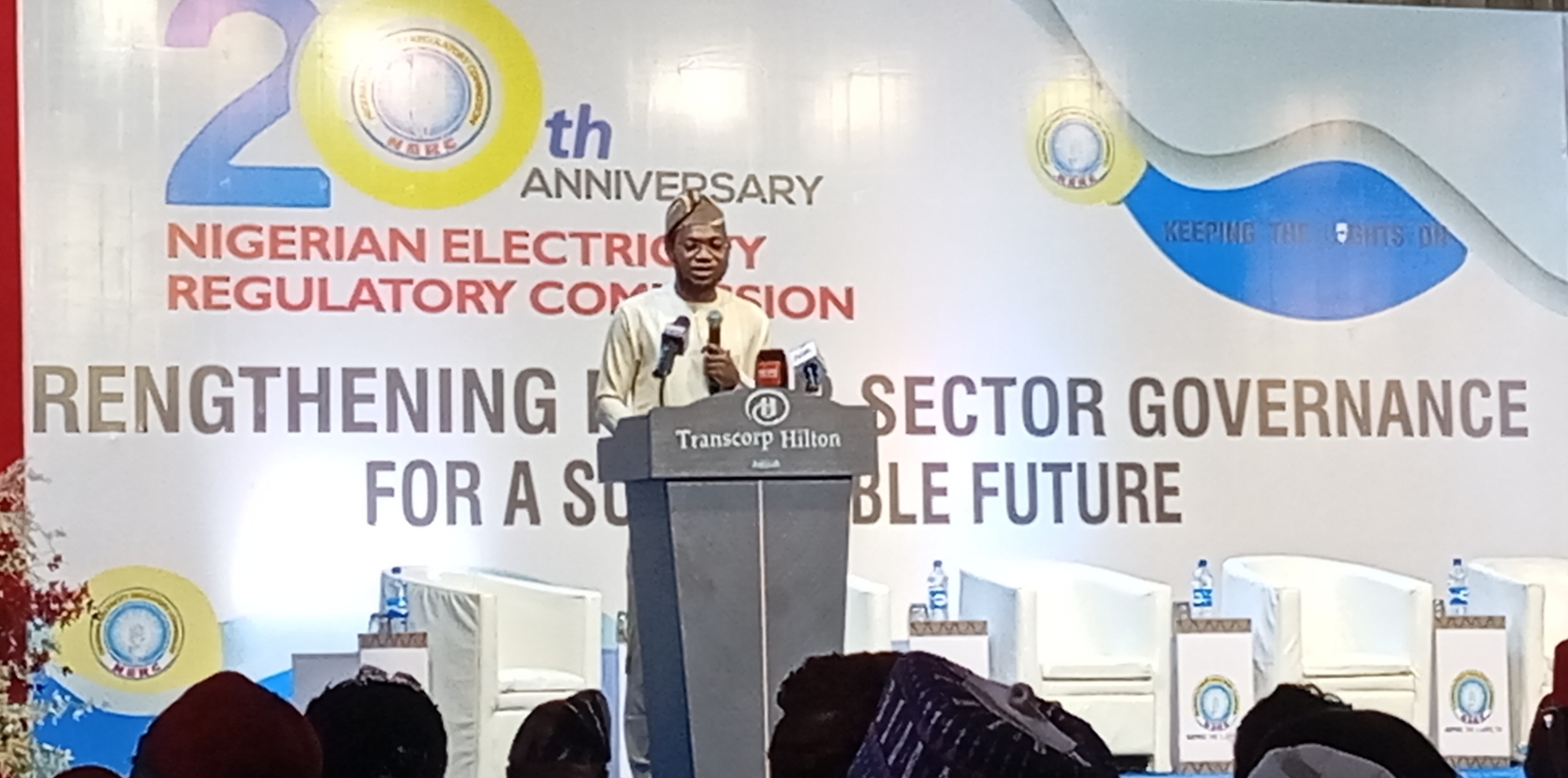NERC Vice Chairman, Dr. Musiliu O. Oseni, while speaking at the event. Photo credit: Optimum Times, 30/10/2025
…Reels Out Achievements Over Two Decades Of Existence
As it marks the 20th anniversary, the Nigerian Electricity Regulatory Commission (NERC) has urged the Federal government to initiate concerted policy measure aimed at providing sustainable electricity supply to the nation’s industrial hubs to boost economic growth and prosperity.
NERC Vice Chairman, Dr. Musiliu O. Oseni, made the call while speaking at the Technical session in commemoration of the 20th anniversary programme of events with the theme: “Strengthening Power Sector Governance for Sustainable Future”, held Thursday.
He further specifically urged the federal government to have a rethink on the spending models on utilisation of the $2bn currently available to the Rural Electrification Agency (REA).
Dr. Oseni urged the federal government to channel part of the fund to provide sustainable electricity supplies to the industrial hubs throughout the Federation to power industrial developments.
According to the NERC Vice Chairman, ” There must be a deliberate policy by the FGN to power our industry for economic prosperity. You can power access through Mini-Grids but you can’t power your economy to prosperity. Thus, there is a need for policy rethink on the utilisation of the USD2bn currently available to the Rural Electrification Agency (REA). A substantial portion of the fund should be dedicated to providing end-to-end solutions to the power supply challenges facing our industrial hubs.”
He disclosed that though 15 states have assumed regulatory oversight over their respective power sector, only eight of them are currently operational.
He advised State Electricity Regulatory Commissions to note that regulation is not populism, activism or politics, rather, it requires being objective, analytical, attention to details, having an independent mind and being able to see beyond the surface.
“You must constantly remember that there must be a utility before you can be called a regulator! While it is impossible to isolate yourself from the government (policymakers or legislature), always remind yourself of your roles as an unbiased umpire. I also urge you to avoid being in a compromising position with your licensees no matter the situation. This is necessary to avoid regulatory capture”, he stressed.
He assured that as NERC would continuously strive to provide regulatory oversights to ensure improved reliability of supply, it shall focus more attention on unlocking private investments especially in the transmission segment of the value chain.
He canvassed for private sector investments in the transmission subsector of the power sector, saying that Government alone cannot sufficiently shoulder it.
According to Dr. Oseni, “Our transmission networks require significant investments. However, our fiscal realities have shown that the government alone cannot fund it. Necessary regulatory framework will go a long way in attracting private investments.
“We have commenced the process through the creation of the Transmission Infrastructure Fund (TIF). I hope this effort will receive the necessary support from the policymakers. Another key priority area is continuous push for fiscal discipline and transparency at TCN. The Commission shall continue the regulatory process for the transition to bilateral trading, and handholding of the state regulatory commissions for capacity development.”
He noted that over the past 20 years, though it has encountered some challenges, it has demonstrated commitment and recorded achievements.
Some of the achievements include the privatisation and unbundling of the hitherto state owned vertically integrated monopoly, development of standard regulatory instruments to strengthen the electricity market, improve reliability of supply and enhance consumer protection.
“Relative to 20 years ago, not less than 30% of the electricity consumers have experienced significant improvement in their electricity services. Through effective regulation, the Commission has saved the Federal Government several trillion of naira in subsidies thereby contributing to the improved fiscal position of the FGN”, he stressed .

 Business News1 week ago
Business News1 week ago
 News1 week ago
News1 week ago
 News1 week ago
News1 week ago



























